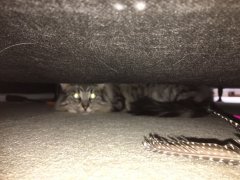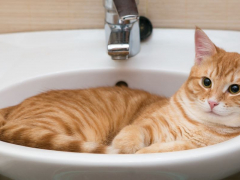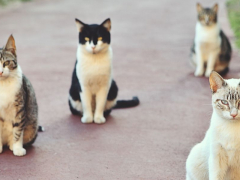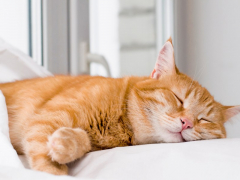
Melina Grin / Cats.com
You’ve probably heard of the ‘”flight or fight response,” a common reaction to fear where both humans and animals tend to react in one of two ways to being startled: either running away or fighting back. What cat owners might be less familiar with is the concept of defecation as a fear response.
Key Takeaways
When cats are scared, their flight or fight response causes temporary shutting down of nonessential functions, including digestion, which can lead to evacuation of the bowels.
The smell of poop and anal gland secretions can also deter would-be predators.
Inappropriate toileting can have medical causes as well as behavioral ones, so an assessment with a veterinarian is recommended alongside environmental modification to reduce stressful stimuli.
A fearful cat might pass feces due to a variety of reasons. Fear brings physiological changes to the body, which can include a loss of bowel control. Additionally, cat might use elimination as a scent warning and to deter predators.
Read on for more about why cats poop when scared, and how to support a scared cat.
Fear and the Digestive System
Certain bodily functions occur without us even thinking about them: our heartbeat, breathing, metabolism, fluid balance, and body temperature, to name a few.
Digestion is one of these functions. We feel hunger and know to eat food, but our body digests food without us having to consciously control it. These tasks are usually controlled by the parasympathetic nervous system, which keeps our bodies running smoothly, without using any mental energy.
All of these changes in a scared animal. Fearful stimuli such as loud noises, a new cat approaching, or a cat trip to the vet elicit a rush of epinephrine (adrenaline), which switches the body over to its fight-or-flight response. This is where the body switches to using the sympathetic nervous system rather than the parasympathetic.
The sympathetic nervous system, when it takes over, shuts down any nonessential functions for immediate survival. Digestion is, obviously, essential, but not in the immediate moment. All energy is temporarily diverted to the heart, muscles, and brain for optimal survival reflexes.
In some cats, this shutting down of digestive functions can lead to immediate emptying of the bladder and bowels. This is not just a cat thing either—many other mammals (including humans) can show this response. The stomach muscles tighten, and the bowel and urinary tract relax and empties, reducing body weight for active flight and relieving the system of the energy requirements of digestion.
This response, when truly due to the cat’s fear, will be immediate. The cat will poop wherever it happens to be when the scary stimulus happens, they won’t go to the litter box or scratch around for a good place to poop, they just go!
Deterring Predators
In the wild, cats are highly skilled predators, but they are also prey. This means that as well as their excellent adaptations for pursuing prey, they also have certain skills at avoiding being preyed upon. Cat poop, if you can believe it, might be one of these skills.
Scent is a hugely valuable sense in the animal kingdom, and passing a poop when scared might be a useful part of the cat’s fear response. Just as a skunk uses a noxious-smelling spray to repel attackers, would-be predators might be put off if their potential meal smells like feces.
This effect can be magnified when a cat releases its anal glands. These small glands are found on either side of the cat’s anus and produce a foul-smelling liquid. They usually empty when the cat poops, as the pressure of the feces pushes the substances out of the glands. Cats can use these glands as part of territorial marking, but they also empty when a cat is scared or excited.
Why Is My Cat So Scared?

New experiences or changes can sometimes overwhelm young kittens if they aren’t properly introduced. Melina Grin / Cats.com
Fearful behavior can be triggered by many scenarios. Here are some common scary situations for cats:
- A new pet in the household or in the area
- A new family member
- A stranger approached them
- A trip to the vet or a boarding facility
- Loud noises such as fireworks
- Unknown objects
- Wild animals
It is important to try and find the source of your cat’s fear, in order to help with reducing their anxiety. Defecating can be a sign of stress or fear in cats, but there are many other symptoms, some of which are more subtle. Some common behavior problems seen in cats are actually due to stress or anxiety.
Common signs of fear in cats include:
- Hiding away
- Defensive or aggressive behaviors such as hissing or spitting
- Tense posture, pinned-back ears, and erect fur
- Changes in eating, sleeping, and toileting habits
- Freezing in certain scenarios
- Vocalizing (usually a yowl or hiss rather than a meow)
Is My Cat Scared-Pooping?
Defecating outside of the cat’s litter box can be a sign of stress or fear, but there are some health issues that can affect your cat’s toileting habits. Constipation is fairly common in cats and can lead to a change in toileting habits and even incontinence if the colon becomes stretched and damaged. Other medical reasons for inappropriate elimination include feline cognitive dysfunction, arthritis, intestinal disease, and food allergies.
If your cat has been passing feces outside the litter box or has had a sudden change to their toileting habits, schedule a checkup with a veterinarian to rule out a medical problem and assess your cat for behavioral concerns.
How To Help a Scared Cat
We all want our cats to be healthy and happy! If you’re concerned about your cat, the first step is to make an appointment with a veterinarian. If medical problems are ruled out, you can make some simple changes to try and optimize your cat’s environment to lessen fear and stress.
Provide your cat with a safe space, preferably somewhere they can retreat to without other pets or people. You might have to get creative using baby gates or cat doors, or provide an elevated bed—cats love to be up high. Make this space as comforting and cozy as you can. If your cat wishes to hide away, let them. Never pursue a scared cat, as they will only feel more threatened. Allow them to retreat if they need to, and re-emerge in their own time.
Cats are creatures of habit, and a set routine can be comforting to them. Try to keep habits such as mealtimes consistent, and avoid any sudden or loud changes to their environment. Novel items, people, pets, and sounds can all be scary to sensitive cats.
Make sure your cat has all the resources they need. Food and water are a given, but remember that it is recommended to have more litter trays than you have cats, with different locations so that your cat cannot be restricted from their access to the litter by other pets. Scratching posts, cat trees, and multiple hiding places are also excellent enrichment and comfort.
Fearful cats might gain some reassurance through the use of pheromone diffusers. Cats use pheromones to communicate, both with themselves and other cats. The feline facial pheromone signals comfort, reassurance, safety, and consistency, and a synthetic version in a diffuser might help keep your cat calm.
If you know what is making your cat scared, and it cannot be removed from your cat’s environment, you might need to consider very slow and gentle desensitization. This might involve a slow introduction to a new pet or a gradual desensitization to loud noises.
Behavioral needs in cats can be multifactorial and complex. If you feel you need additional help, contact a qualified animal behaviorist.
Cats Pooping When Scared: Final Thoughts
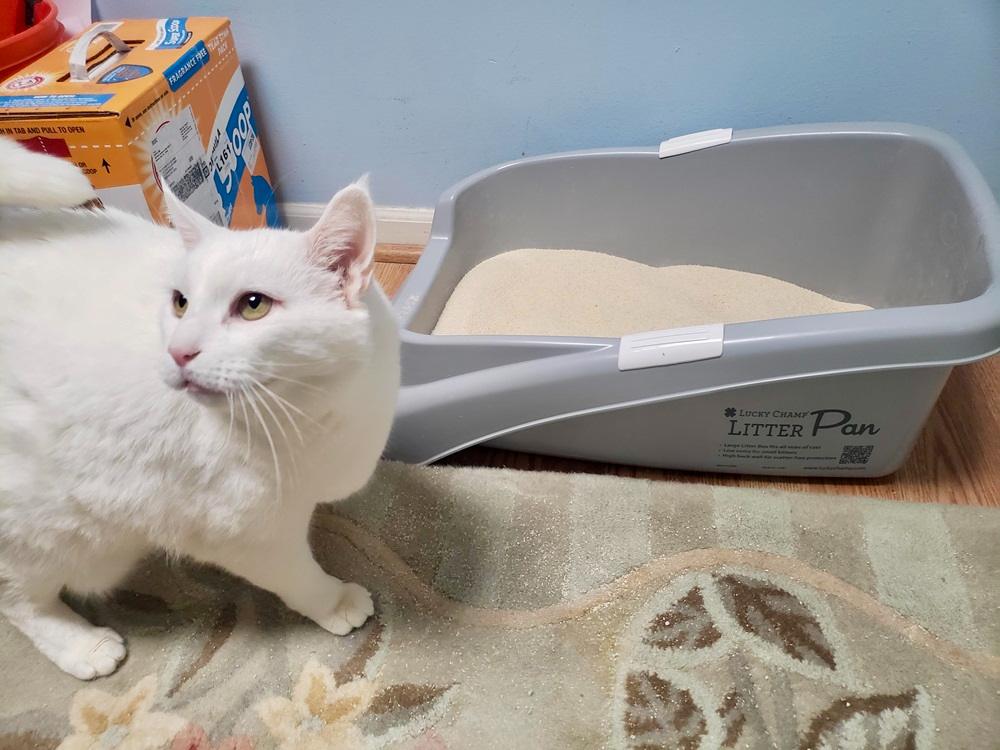
Pooping from fear is an immediate response, but regularly pooping outside the litter box might have a different cause. Liz Coleman / Cats.com
Releasing the bladder and bowels when scared can be a part of the feline fear response, both to release the body of nonessential weight and to deter any potential predators. However, inappropriate elimination can have other causes, such as certain medical problems.
If your cat is defecating outside the litter tray, rule out medical causes with a veterinarian checkup, then investigate changes you can make to your cat’s environment to help them feel more reassured and relaxed.
Frequently Asked Questions
Do cats poop if they are scared?
Yes, some cats (and other mammals) can poop when scared. This is as the body shifts to "flight or fight" mode when scared, and releases nonessential functions such as the digestive contents. Pooping can also warn off potential predators by its bad odor.
How do I stop my cat from pooping when scared?
First, rule out any underlying medical problems. Then, try and identify the source of the fear and provide your cat with an escape route and a safe place away from the scary stimulus. A gradual and gentle desensitization process may be required.
Why do cats poop when attacked?
An attack will provoke fear. The chemicals involved in the fear response in cats shift the body into "flight or fight" mode, which can involve temporarily shutting down nonessential functions such as digestion, leading to the bladder and bowels being emptied. The smell may also put off would-be attackers.

